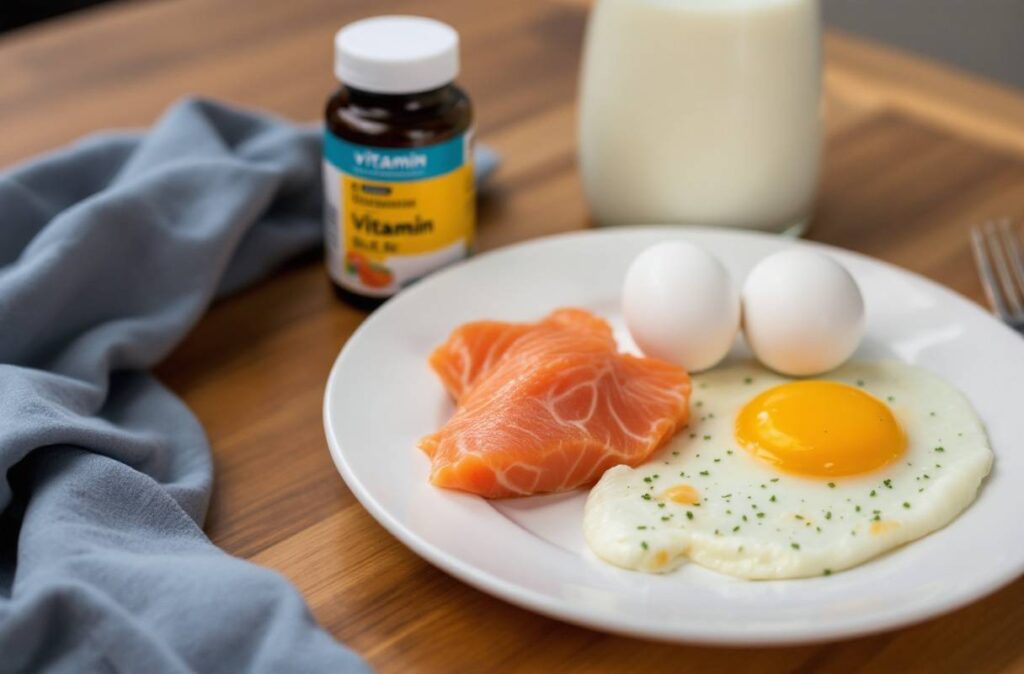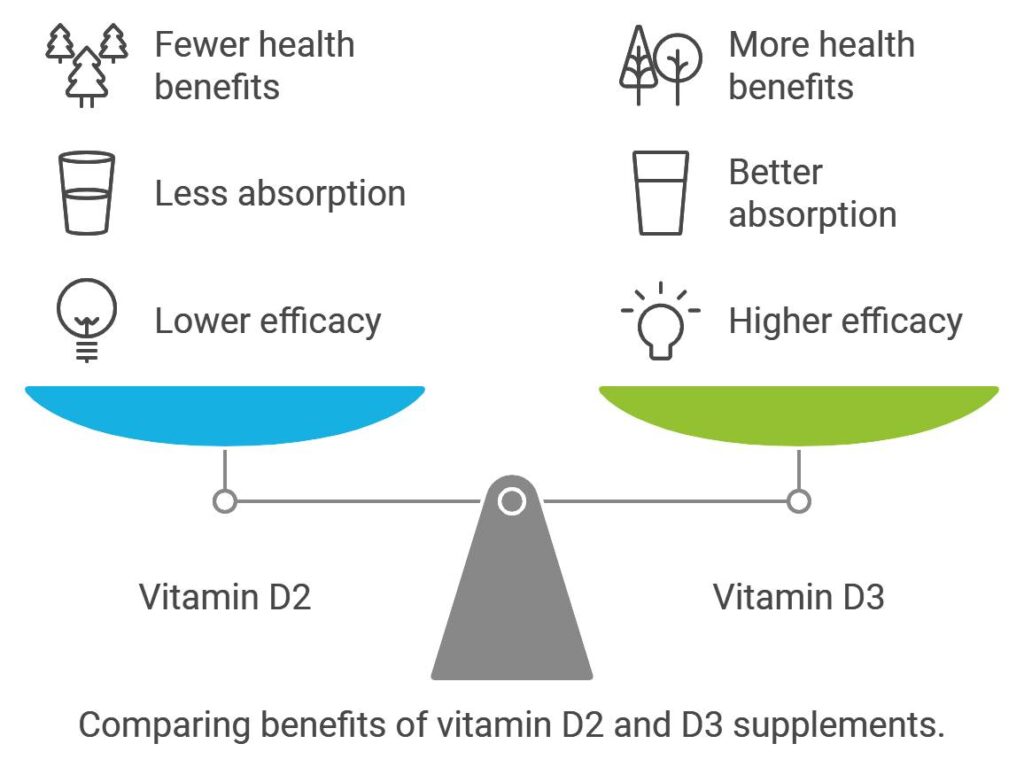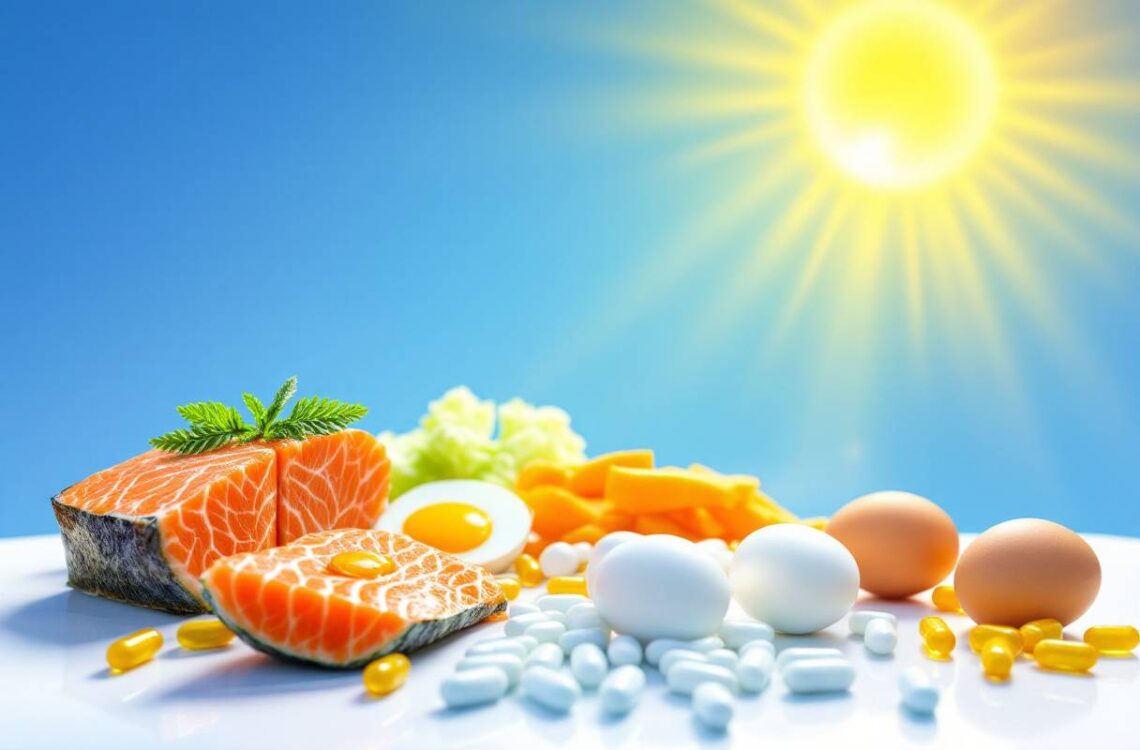Vitamin D, often called the “sunshine vitamin,” is more than just a trending health buzzword—it’s a cornerstone of overall wellness.
From boosting your immune system to strengthening your bones and even lifting your mood, this fat-soluble vitamin plays a crucial role in keeping your body functioning at its best.
But with modern lifestyles keeping us indoors and dietary sources sometimes falling short, many people are left wondering: Am I getting enough Vitamin D?
In this guide, we’ll break down the importance of Vitamin D, where to find it, and how to choose the right supplement to meet your needs.
The Importance of Vitamin D
“Vitamin D: The Sunshine Vitamin You Can’t Afford to Miss”
Role of Vitamin D in the Body
Vitamin D, the ol’ “sunshine vitamin,” is like a VIP pass to good health. It’s a fat-loving vitamin that helps with all sorts of things:
Bone Health: Helps your body slurp up that calcium goodness to keep bones and teeth tough. So, no more rattling bones or toothless grins. Check out our piece on calcium vs vitamin d for extra info.
“Vitamin D is essential for calcium absorption—without it, bones can become thin or brittle.” — National Institutes of Health
Immune System Support: Keeps your body’s defenses in tip-top shape. Essential for anyone looking to avoid feeling crummy.
“Vitamin D helps activate T-cells in the immune system that fight off infections.” — Harvard Medical School
Mood Regulation: Got the blues? Studies suggest vitamin D might just give your mood a boost, warding off the doom and gloom.
Cell Growth: It’s like a handyman, assisting in cell growth, repair, and even reducing those annoying inflammations.

Sources of Vitamin D
How do you snag some of this must-have vitamin? Here’s a handy list:
| Source | Vitamin D Content (IU) |
|---|---|
| Sunlight (15 minutes) | 1000 – 3000 |
| Wild-caught Salmon (3.5 oz) | 988 |
| Fortified Milk (1 cup) | 115 – 124 |
| Egg Yolks (1 large) | 41 |
| Fortified Orange Juice (1 cup) | 137 |
- Sunlight: Your skin is basically a vitamin D factory when exposed to sunlight. Just 15 minutes in the sun several times a week and you’re golden.
- Fatty Fish: Feast on salmon, mackerel, or sardines for a vitamin D kick.
- Fortified Foods: Stuff like milk and cereal often get a vitamin D boost to help you hit those daily goals. Want fortified food tips? Peek at our guide on how to choose multivitamin.
- Supplements: If you’re not getting enough sunshine or fish on your plate, vitamin D supplements can be your backup plan. Curious about which ones to pick? Check out best vitamin d supplements for some guidance.
Keeping your vitamin D game strong is smart for everyone—from the go-getting athlete to grandma at home. Knowing how it helps and where to find it makes staying on top of health a breeze.

Who Needs Vitamin D Supplements?
Vitamin D is like that hidden blockbuster nutrient everyone’s talking about—worth a second look. It’s especially vital for some folks who might find themselves running low. Check out who might really dig adding this to their daily mix.
Health-watchers
The foodie fitness friends—you know the type. These folks focus on a well-rounded diet but sometimes miss this crucial piece of the health puzzle. Vitamin D boosts your mood, stitches bones together like a master quilt, and adds a little armor to your immune system. Peek at our collection of must-have vitamins and minerals for more about feeding your body the good stuff.
Folks with Health Hiccups
Got bones that ache, or a doc who’s mentioned your vitamin D tank’s running on empty? Those with past deficiencies or autoimmune issues might need a little extra sunshine in a pill. Having a real chat with your healthcare sidekick can line you up for what your body truly craves.
Veggie Lovers and Plant Purists
When your plate looks like it just stepped out of a garden party, getting vitamin D might call for some extra planning, mainly because animal products are usually the MVPs for this nutrient. Try out a supplement to fortify your plant-powered diet. And if you’re all about that vegan life, our vegan B12 supplement guide might just become your new best friend.
| Group | Why the D Deficiency? |
|---|---|
| Vegetarians | Not many plant D sources |
| Vegans | Skipping animal products |
The Wise and Wonderful
As the years stack up, sun-soaked vitamin D creation in our skin takes a bit of a nosedive. Older adults can keep those joints jumping with a little supplement magic. If you’re mixing and mingling with calcium, check our calcium vs. vitamin D chat for the lowdown on why they’re the dream team.

Sports Buffs
Chasing that personal best? Whether you run for gold or just love a good sweat, vitamin D is part of the backstage crew making sure muscles and bones are strong enough to fuel your weekend warrior antics. A solid D dose helps keep you on top of the game.
Caring Hearts
Parents and caregivers are all about keeping their loved ones (young, old, and everyone in between) healthy and happy. Make sure the vitamin D train doesn’t skip the station in your child’s or elderly relative’s routine. Especially important for expecting mamas—explore our best prenatal vitamins list to keep you and baby floating on cloud nine.
To sum it up, anyone from health-savvy gym rats to green-eating vegans, seasoned elders, and devoted caretakers might say hello to vitamin D supplements. Chatting with a healthcare pro about your specific needs ensures you’re not missing out on this game-changer for your health.
Understanding Vitamin D Supplements
Looking to boost your Vitamin D but unsure about all those options staring back at you? Let’s decode the best picks for your Vitamin D needs.

Different Kinds of Vitamin D Supplements
Vitamin D supplements come in multiple flavors and styles to fit your lifestyle:
- Vitamin D2 (Ergocalciferol)
- Comes from plants and fungi
- Ideal for vegetarians and vegans
- Usually in foods that have a little help getting fortified
- Vitamin D3 (Cholecalciferol)
- Harvested from animal products, mainly from happy sheep’s wool
- Packs more punch in raising your Vitamin D levels
- More of a favorite for its fast effects
- Liquid Vitamin D
- Great if pills feel a bit too chalky
- Comes with fewer extras in the mix, usually
- Vitamin D Gummies
- A hit with kiddos and adults alike who enjoy a sweet treat
- Comes in fun flavors and makes taking vitamins less of a chore
- Combo Supplements
- Mixes in other good-for-you stuff like calcium or magnesium
- Handy for tackling a couple of shortages at once
Check out more on getting your daily dose of essentials in our essential vitamins and minerals article.
| Type | Origin | Absorption Power | Vegan-Friendly |
|---|---|---|---|
| Vitamin D2 | Plants/Fungi | Not as strong | Yep |
| Vitamin D3 | Animal stuff | Stronger | Nah |
| Liquid Vitamin D | Mixed sources | Quite high | Depends |
| Gummies | Mixed sources | Decent | Varies |
| Combination | Mixed sources | Varies | Varies |
Picking Your Perfect Vitamin D Supplement
Here’s the low-down on choosing the right Vitamin D booster:
- High Score Dosage
- Tailor it to you: Have a word with your health pro about the best dose for your age, health, and how much sunshine you’re catching.
- For adults, it’s typically between 600 to 2,000 IU daily.
- Which Vitamin D Form?
- Between D2 and D3, it’s your call based on diet and how well you absorb it.
- If pills aren’t your thing, maybe liquids or gummies will save the day.
- Extra Stuff
- Look out for supplements with extra goodies like calcium or magnesium, but remember: not everything’s for everyone.
- Keep an eye on things you’re allergic to and stuff you don’t need.
- Health Check: Medical Conditions and Interactions
- Make sure nothing messes with any meds or conditions you have.
- Think about what’s best for things like bone support or boosting immunity.
Got a sporty side? Make sure your Vitamin D’s on point for those muscles and top performance. For older folks, a bigger dose might be wise due to lower absorption. Vegetarians and vegans can give D2 a thumbs-up or check plant sources.
Hop on to our guide on how to choose multivitamin for more tips.
These pointers will steer anyone health-minded, dealing with health woes, vegan or veggie eaters, aged folk, fitness buffs, or caregivers in the right direction for picking the Vitamin D supplement that suits them best.

Factors to Consider
Picking the right vitamin D supplement isn’t just a leap of faith. You’ve got to think about what suits your needs, keeps you safe, and actually works.
Dosage
How much vitamin D you need is like choosing the right gear for an adventure—it depends on your age, health, and blood work. Here’s a quick peek at what’s generally recommended:
| Age Group | Recommended Daily Allowance (IU) |
|---|---|
| Infants (0-12 months) | 400 IU |
| Kids (1-18 years) | 600 IU |
| Grown-ups (19-70 years) | 600-800 IU |
| Seniors (71+ years) | 800 IU |
| Expecting or Nursing Moms | 600-800 IU |
If life’s thrown a health curveball your way, you might need more, but it’s best to chat with a doc who knows you like no one else.
Form of Vitamin D
Vitamin D is like choosing between two types of tea—D2, which is plant-based and great for those on a vegan path, and D3, an animal-source option that’s a pro at upping your vitamin D levels. Want to dive into this topic? Check out our piece on fat-soluble vitamins.
Additional Ingredients
Some vitamin D supplements come with extra goodies:
- Calcium: It’s a trusty sidekick for bone adventures. For more, read about calcium vs vitamin D.
- Vitamin K2: Partners with vitamin D, like Batman and Robin, for strong bones and a happy heart. Curious? See benefits of vitamin K2.
- Other Vitamins and Minerals: Some supplements pack a whole crew of nutrients. Get tips on picking multivitamins in how to choose multivitamin.
Medical Conditions and Interactions
Got some health stuff going on? Or taking meds? This could matter:
- Kidney Disease: That can mess with how you process vitamin D.
- Hypercalcemia: Too much D can make it worse.
- Medication Interactions: Things like steroids or certain diet and cholesterol meds might get in the way of vitamin D doing its thing.
Your doctor is your best buddy here, making sure the vitamin D you pick doesn’t clash with your existing regimen. Curious about what else you might need? Check out essential vitamins and minerals.
By keeping these pointers in mind, picking the right vitamin D can be as smooth as silk, and you’ll be on your way to feeling fab all over.
Best Practices for Taking Vitamin D Supplements
Getting the most out of your vitamin D supplements doesn’t need to be rocket science. Here’s how you can make them work harder for you.
Timing and Frequency of Intake
When you take your vitamin D matters. Since it’s a fat-friendly vitamin, couple it with something greasy—like a piece of toast slathered with butter or a spoonful of peanut butter—to help it do its thing.
How often should you take it? That’s kind of up to you and your body’s needs. Some do a small daily dose, while others chug a heftier amount weekly. It’s wise to chat with your doc to figure out what suits you best.
| Dosage | Frequency |
|---|---|
| 600-800 IU | Daily |
| 2,000-4,000 IU | Weekly or Bi-weekly |
Pairing with Other Supplements or Foods
Hooking vitamin D up with its nutrient buddies can turbocharge its power. Calcium’s a great sidekick for keeping those bones strong. Magnesium’s another teammate, hitting the sweet spot for bone health. Team it with vitamin K2, and you have a calcium-balancing act.
Add fish or flaxseeds into your meal—they’re loaded with Omega-3s and the fats help vitamin D soak-in better.
Monitoring Vitamin D Levels
Keeping tabs on your vitamin D levels is no joke. Regular blood work can tell you if you’re good to go or if you need to adjust. This is clutch info, especially if you’re dealing with specific health worries, aging, or having a love-hate relationship with sunlight.
| Vitamin D Level (ng/mL) | Status |
|---|---|
| < 20 | Running Low |
| 20-30 | Need More |
| 30-100 | Just Right |
| > 100 | Hold Up! Too Much |
Nailing the right level helps dodge both shortage and overload. Feel clueless about your vitamin D score? Your local health guru can set you up with a test and give you the 411 on next steps.
Follow these simple tips, and you’ll be riding the wave of vitamin D goodness in no time. Hungry for more? Peek at our other pieces on vital vitamins and picking multivitamins.
Conclusion
Vitamin D is essential for everyone—from athletes and older adults to vegans and caregivers.
Whether you’re soaking up the sun or relying on supplements, ensuring adequate Vitamin D intake can help support bone health, immune function, mood regulation, and cell growth.
By understanding the different types of Vitamin D supplements (D2 vs. D3), their sources, and how they fit into your lifestyle, you can confidently make informed decisions for better health.
Remember to consult with a healthcare provider to tailor your dosage and ensure you’re on the right track toward optimal wellness.
FAQs
- What are the key benefits of Vitamin D?
- Vitamin D supports bone health by aiding calcium absorption, boosts immunity, regulates mood, and assists in cell growth.
- How much Vitamin D should I take daily?
- The recommended daily intake varies: 600-800 IU for adults and 800 IU for seniors. Consult a doctor for personalized advice.
- What foods are high in Vitamin D?
- Fatty fish like salmon, fortified milk, egg yolks, and fortified orange juice are great sources of Vitamin D.
- Who should consider taking Vitamin D supplements?
- Those with limited sun exposure, older adults, vegans/vegetarians, and individuals with certain health conditions may benefit from supplements.
- What’s the difference between Vitamin D2 and D3?
- Vitamin D2 is plant-based and suitable for vegans; Vitamin D3 is more effective at raising blood levels but comes from animal sources.




